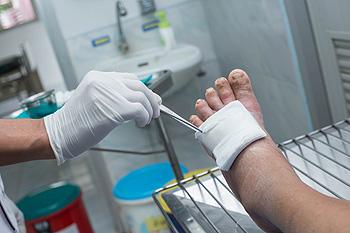Diabetic foot ulcers (DFUs) unfortunately have a high chance of becoming infected. All DFUs may be treated by cleaning them, then covering them with a protective bandage. Resting the affected foot and not allowing pressure on the wound will also help the DFU heal. Further treatment for an infected DFU depends on the severity of the infection. A mild infection, which involves the upper layer of skin that can cause redness, swelling, and pain, is usually treated with a non-sticky dressing that is applied every one to two days. A moderate infection, which involves deeper layers of the skin, is typically treated with antibiotics as well. A severe infection, which can cause sepsis, often needs to be treated in the hospital. For more information about DFUs and how to treat and prevent them, consult with a podiatrist.
Diabetic foot care is important in preventing foot ailments such as ulcers. If you are suffering from diabetes or have any other concerns about your feet, contact Kevin Powers, DPM from The Center for Lower Extremity Nerve Surgery. Our doctor can provide the care you need to keep you pain-free and on your feet.
Diabetic Foot Care
Diabetes affects millions of people every year. The condition can damage blood vessels in many parts of the body, especially the feet. Because of this, taking care of your feet is essential if you have diabetes, and having a podiatrist help monitor your foot health is highly recommended.
The Importance of Caring for Your Feet
- Routinely inspect your feet for bruises or sores.
- Wear socks that fit your feet comfortably.
- Wear comfortable shoes that provide adequate support.
Patients with diabetes should have their doctor monitor their blood levels, as blood sugar levels play such a huge role in diabetic care. Monitoring these levels on a regular basis is highly advised.
It is always best to inform your healthcare professional of any concerns you may have regarding your feet, especially for diabetic patients. Early treatment and routine foot examinations are keys to maintaining proper health, especially because severe complications can arise if proper treatment is not applied.
If you have any questions please feel free to contact our offices located in Indianapolis and Bloomington, IN . We offer the newest diagnostic and treatment technologies for all your foot and ankle needs.

